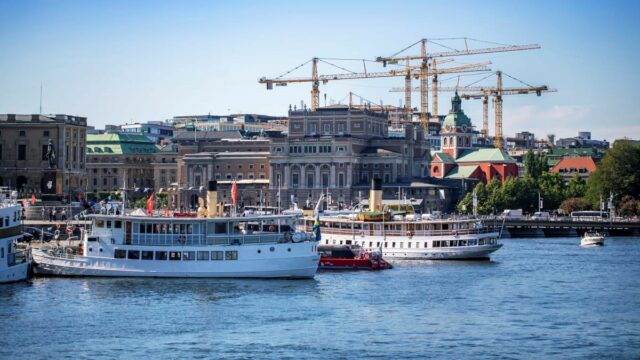The public transit industry in Sweden has agreed on an ambitious new target of four out of ten motorized journeys to be made by public transportation by 2030. In the wake of the pandemic, all stakeholders need to contribute to meet customer expectations and achieve sustainability goals with the resources that deliver the most value per euro invested. Maritime transportation can play an important role in this effort. Here are Transdev Sweden’s proposals for establishing sustainable and efficient maritime transportation in the Stockholm Region already by 2030.
Maritime transportation is often overlooked in public transit planning because it is perceived as both environmentally damaging and expensive. But our latest report shows that the carbon emissions from shuttle boat line 89 between Klara Mälarstrand in Stockholm and Ekerö were a quarter as high as the emissions from the equivalent car commute. Our analysis also shows that boat commuting can be more cost-effective than other modes of transport if the calculation models are made mode neutral.
Our vision is a sustainable and fossil-free maritime transport, fully integrated into the public transit system, offering a competitive alternative to the car and relieving the burden on public transportation on land. We want to be a leading player in the transformation of how public transportation by sea can become the crowning glory of a sustainable public transit system in Stockholm. See this as our contribution to continued regional development.
Anna Höjer, CEO of Transdev in Sweden
Four proposals to achieve the vision:
- Coordination for integration: Transit modes should be able to be coordinated and jointly developed. We propose that public transportation by sea be put on an equal footing with metro, commuter trains, buses and local railways, with new efficient connections and the same common tariff throughout the system. The integration of maritime transportation into public transit is the basis for reaping the benefits it can bring.
- Developing well-functioning transit nodes: For us a jetty is synonymous with a transit stop. Good and safe transit stops are essential for all public transportation. The same is true for maritime public transportation. Basic criteria are weather protection, lighting, signage and accessibility. Major nodes should also be a transfer point between different modes of transportation and have a relatively high level of service.
- Establish new routes: Maritime transportation in Stockholm has developed in recent years with the addition of shuttle boat lines. These lines are very popular and have the highest customer satisfaction of all public transport in the county. There is potential to develop more routes, as the infrastructure in terms of water and jetties in connection with attractive destinations is largely already in place. In our vision, we have proposed four lines that can contribute to the development of the region.
- Developing climate-smart vessels: Ship hulls have a long lifespan. Propulsion and other technologies can be replaced several times during the lifetime of the vessel, enabling vessels to be converted to climate and environmentally efficient means of transportation in a smooth manner. Our own goal is to have a completely fossil-free fleet by 2030. We believe in a mix of different technology and energy solutions such as hybridization and electrification, but also biofuels with exhaust after-treatment. Planning for conversion, drawing on the experience of shipowners, investing in lighter and faster vessels and introducing an electric boat premium are some proposals that will accelerate the conversion of vessels.
More information about the proposals is available in Swedish on www.transdev.se.
More about Transdev’s experience in public transit at sea:
Transdev is one of the world’s largest mobility companies with 83,000 employees around the world. We operate boat services in the Stockholm archipelago and Lake Mälaren on behalf of Waxholmsbolaget and SL with our shipping company Blidösundsbolaget. Transdev also has experience in the archipelago and river traffic in Gothenburg with our shipping company Styrsöbolaget and operates shuttle boats in Sydney, Australia and several cities in France such as Nantes and Toulon.

